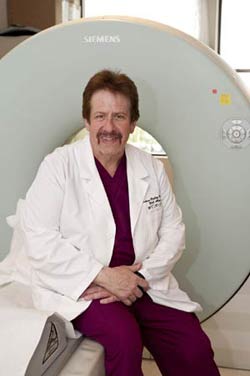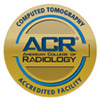Diagnosed tests are performed by the Urology Division of Premier Medical Group.
Diagnosed tests are performed by the Urology Division of Premier Medical Group.

Computed tomography, also called computerized axial tomography (CAT) scan, is used to create cross-sectional images of structures in the body. In this procedure, x-rays are taken from many different angles and processed through a computer to produce a three-dimensional (3-D) image called a tomogram.
Computed tomography is used to detect abnormalities such as blood clots, cysts, fractures, infections, and tumors in internal structures (bones, muscles, organs, soft tissue). The procedure also may be used to guide the placement of instruments within the body.
Your doctor may order a contrast agent (such as an iodine based dye or barium solution) to be administered prior to CT scan to allow organs and structures to be seen more easily. Contrast agents can be administered through a vein (IV), by injection, or taken orally. Generally, patients are instructed not to eat or drink for a few hours prior to contrast injection or IV because the dye may cause stomach upset.

 Premier Medical Group has been awarded a three-year term of accreditation in computed tomography (CT) as the result of a recent review by the American College of Radiology (ACR). The ACR gold seal of accreditation represents the highest level of image quality and patient safety. It is awarded only to facilities meeting ACR Practice Guidelines and Technical Standards after a peer-review evaluation by board-certified physicians and medical physicists who are experts in the field. Image quality, personnel qualifications, adequacy of facility equipment, quality control procedures, and quality assurance programs are assessed. The findings are reported to the ACR Committee on Accreditation, which subsequently provides the practice with a comprehensive report they can use for continuous practice improvement.
Premier Medical Group has been awarded a three-year term of accreditation in computed tomography (CT) as the result of a recent review by the American College of Radiology (ACR). The ACR gold seal of accreditation represents the highest level of image quality and patient safety. It is awarded only to facilities meeting ACR Practice Guidelines and Technical Standards after a peer-review evaluation by board-certified physicians and medical physicists who are experts in the field. Image quality, personnel qualifications, adequacy of facility equipment, quality control procedures, and quality assurance programs are assessed. The findings are reported to the ACR Committee on Accreditation, which subsequently provides the practice with a comprehensive report they can use for continuous practice improvement.
 Urologists employ this procedure to see the inside of the lower urinary tract (urethra, prostate, bladder neck, and bladder). Cystoscopy can also be used to detect abnormalities of the lower urinary tract or to assist in transurethral surgery (e.g., prostate surgery).
Urologists employ this procedure to see the inside of the lower urinary tract (urethra, prostate, bladder neck, and bladder). Cystoscopy can also be used to detect abnormalities of the lower urinary tract or to assist in transurethral surgery (e.g., prostate surgery).
The cystoscope, which is a thin, telescope-like tube with a light and tiny camera attached, is inserted into the bladder through the urethra (the tube that carries urine from the bladder out of the body).
Cystoscopy may be used to evaluate and diagnose blood in the urine, chronic pelvic pain, painful urination, interstitial cystitis, urinary tract infections, overactive bladder, incontinence, urinary stones, or bladder cancer. Cystoscopy may be performed in a physician’s office, under local anesthesia, or as an outpatient procedure, under sedation with regional or general anesthesia.
Patients should notify their physician if they are taking any medications, especially blood thinners such as aspirin, ibuprofen, or Coumadin.
Make sure to tell the doctor if you have any drug allergies and have had bleeding problems, are taking take blood-thinning medicine, such as aspirin or warfarin (Coumadin), or if you could be pregnant.
You should empty your bladder just before the test. You may be given medicine to prevent a urinary tract infection that could be caused by the test.
If regional or general anesthesia is being used, patients are instructed to fast for at least 4 hours before the procedure. If local anesthesia is being used, a topical anesthetic (lidocaine) is introduced prior to the procedure to numb and lubricate the urethra.
At Premier Medical Group Urology Division, cystoscopies are performed in the Poughkeepsie, Kingston and Fishkill locations.
 Magnetic Resonance Imaging is a test that uses a magnetic field and pulses of radio wave energy to make pictures of organs and structures inside the body. In many cases MRI gives different information about structures in the body than can be seen with an X-ray, ultrasound, or computed tomography (CT) scan. MRI also may show problems that cannot be seen with other imaging methods.
Magnetic Resonance Imaging is a test that uses a magnetic field and pulses of radio wave energy to make pictures of organs and structures inside the body. In many cases MRI gives different information about structures in the body than can be seen with an X-ray, ultrasound, or computed tomography (CT) scan. MRI also may show problems that cannot be seen with other imaging methods.
For an MRI test, the area of the body being studied is placed inside a special machine that contains a strong magnet. Pictures from an MRI scan are digital images that can be saved and stored on a computer for more study. The images also can be reviewed remotely, such as in a clinic or an operating room.
In some cases, contrast material may be used during the MRI scan to show certain structures more clearly.
This test is used to evaluate male fertility, the ability to reproduce. Also called a sperm count, it’s used to measure the amount and quality of seminal fluid (ejaculate). The seminal fluid contains male reproductive cells (sperm) and is normally is expelled through the penis during ejaculation.
 Seminal fluid can affect factors such as sperm shape, function, and movement, so the entire ejaculate is examined.
Seminal fluid can affect factors such as sperm shape, function, and movement, so the entire ejaculate is examined.
Semen analysis also can be used to help diagnose Klinefelter’s syndrome, which is the most common inherited cause of testosterone deficiency.
To prepare for the semen analysis, ejaculation should be avoided for 2-3 days. The sample can be collected in a sterile glass container through masturbation or through sexual intercourse, using a special type of condom provided by the physician.
Three different semen samples are recommended to account for factors that can affect results, such as variations in temperature and laboratory errors.
Semen analysis includes the following factors:
You will find a list of labs convenient to Poughkeepsie, Fishkill, Kingston and Rhinebeck.
 The procedure, also called prostate ultrasound with prostate biopsy, provides the doctor with images of the prostate and surrounding tissue which allows him to examine the gland for abnormalities (e.g., enlarged prostate [BPH], prostate cancer). TRUS involves using a special device (transducer) that reflects high-frequency sound waves off internal structures to create detailed images called sonograms. A similar procedure called scrotal sonography is used for a preliminary diagnosis of testicular cancer.
The procedure, also called prostate ultrasound with prostate biopsy, provides the doctor with images of the prostate and surrounding tissue which allows him to examine the gland for abnormalities (e.g., enlarged prostate [BPH], prostate cancer). TRUS involves using a special device (transducer) that reflects high-frequency sound waves off internal structures to create detailed images called sonograms. A similar procedure called scrotal sonography is used for a preliminary diagnosis of testicular cancer.
Transrectal ultrasound is generally used to diagnose prostate cancer in patients with an abnormal digital rectal examination or elevated PSA level, to assess prostate volume, to detect inflammation of the prostate (prostatitis), and to help determine the cause of infertility, such as blockages caused by prostatic cysts). TRUS also can be used to deliver and monitor prostate cancer treatments such brachytherapy and cryotherapy.
At Premier Medical Group Urology Division, this procedure is performed in both the Poughkeepsie and Kingston locations.
Urinalysis, also referred to as a routine urine test, is used to check for abnormalities in the urine. There are a number of diseases and conditions which can result in abnormalities in the urine and can often be detected through physical, chemical, and microscopic examination.
 Urinalysis may be performed to detect a urinary tract infection (UTI), protein in the urine or blood in the urine. Urinalysis may be performed as part of a regular physical examination to screen for early signs of disease. In patients who have kidney disease or diabetes, urine tests are used to monitor the condition.
Urinalysis may be performed to detect a urinary tract infection (UTI), protein in the urine or blood in the urine. Urinalysis may be performed as part of a regular physical examination to screen for early signs of disease. In patients who have kidney disease or diabetes, urine tests are used to monitor the condition.
Urinalysis tests are available in all locations, Poughkeepsie, Fishkill, Kingston, and Rhinebeck.
Urinalysis involves checking the appearance and color of the urine. Urine can appear clear or cloudy, vary in color from pale yellow to dark yellow, and even red, green, or blue. Infections may cause the urine to be atypical in color and cloudy.
Urine color can be affected by certain foods (beets, asparagus, blackberries), ingested dyes (food coloring), and a number of medications. The presence of bilirubin, which may indicate liver disease, can make the urine dark in color, even olive green, and hemoglobin, which may indicate injury to the urinary tract, can make the urine pink or red.
Medications, the presence of riboflavin (B complex vitamin, laxatives), B complex vitamins, and carotene (found in yellow vegetables) can all affect the color of the urine.
Urinalysis should be performed within 15 minutes of collecting the urine sample. If that is not possible, the urine should be refrigerated.
 Blood tests can be used to diagnose and observe a variety of urologic conditions. Often, blood work results can help doctors determine if further lab tests or treatments are necessary.
Blood tests can be used to diagnose and observe a variety of urologic conditions. Often, blood work results can help doctors determine if further lab tests or treatments are necessary.
Blood testing is a routine procedure. A blood test involves using a needle to collect blood, usually from a vein in the arm. This blood sample is then sent to a laboratory for analysis.
Here are some common blood tests that health care providers use to help diagnose urologic conditions:
Premier Medical Group Urology Division does not provide blood tests. Click here to find a list of labs convenient to Poughkeepsie, Fishkill, Kingston, Newburgh and Rhinebeck.
